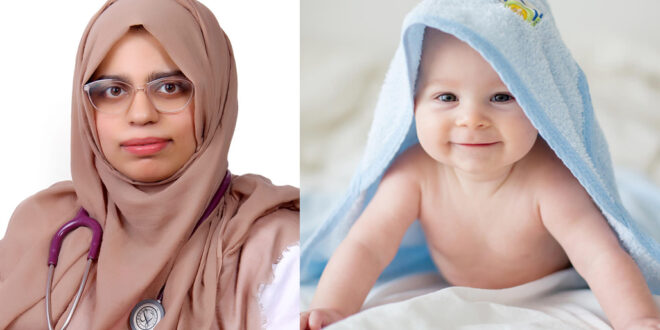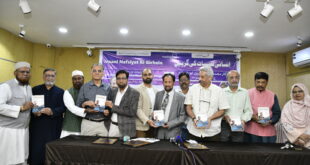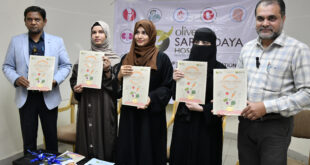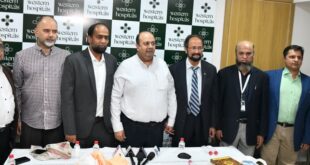When it comes to child health, there is no room for mistakes. However, we commit many while knowing some, and some knowing little to none. Noted Pediatrician Dr. Amreen, who has also worked with Niloufer Children’s Hospital and now works as a Consultant Pediatrician at Caspian Healthcare at VijayNagar Colony in Hyderabad, believes that lack of adequate awareness among parents and general mis-practices are the major contributing factors of children falling ill frequently. In an insightful interview, Dr. Amreen shares her recent experience with a patient and talks about pediatric missteps and health disasters caused by the incognizance of a caregiver. Here are some excerpts from the conversation.
Q: Dr. Amreen, can you start with what you have to share, perhaps, a recent experience, or a case worth mentioning?
Dr. Amreen: Certainly. I came across an infant who was suffering from diarrhea, a common yet concerning issue in young children. After examining the baby, I inquired about the feeding practices, particularly whether the baby was bottle-fed.
Q: Why does bottle-feeding matter here?
Dr. Amreen: The mother confirmed that the baby was being bottle-fed, but what was alarming was her approach to maintaining the bottles. She was not sterilizing them properly and simply used regular drinking water to prepare the formula. The condition of the baby’s feeding bottle was unsanitary, with curdled milk residue and an old dirty sock instead of a protective cap.
Q: What was your reaction to this? How did you address this situation with the mother?
Dr. Amreen: I explained to the mother that this unsanitary bottle maintenance was a significant contributor to her baby’s diarrhea. The baby had been suffering for around four days, with frequent episodes of vomiting and loose stools. Moreover, the child often fell ill, experiencing diarrhea or upper respiratory tract infections, two to three times a month.
Q: Is that a common problem? What was your advice to the mother?
Dr. Amreen: Yes, it is a common problem. Some people do not realize the amount of care children need. They are delicate, and so is their immune system. A mother can basically do two things to avoid such problems. First, the use of multiple bottles, at least one as primary, and other as a spare could help. They must be thoroughly washed and sanitized with hot water after each use. The second and a slightly simpler option is to eliminate using a feeding bottle altogether. This is easier if the baby has attained one year of age. In such a situation, the bottle can be replaced with a sippy cup or open cup feeding to make this transition smoother.
Q: Is maintaining bottles and ensuring proper sanitation challenging for mothers? And what are the consequences if they neglect this aspect?
Dr. Amreen: I understand that busy mothers might find it challenging to sanitize and maintain bottles, especially if they have limited numbers. However, using 4 to 6 bottles and batch sanitizing can make the process more manageable. Neglecting proper bottle maintenance can lead to frequent infections, growth retardation, lower immunity, malnutrition, and failure to thrive in the child.
Q: There clearly seems to be a guidance for every mother from this case.
Dr. Amreen: Yes, this was an interesting case, mostly because it highlights the lack of awareness among parents regarding safe infant feeding practices. Even if parents are aware, they may not have practical tips on how to bottle-feed a baby safely. Caregivers must understand the significance of cleanliness and proper bottle maintenance to ensure the health and well-being of their infants. We must take education and awareness around this topic seriously, and give it the importance it deserves. Good parenting starts with good care, and good care begins with good hygiene.
The neglect of a simple hygiene practice in feeding the baby leads to the child suffering from diarrhea. Sometimes, the problems can get worse, if not detected in time, or after prolonged use of unsanitary feeding bottles. If you know a mother or have met someone who has become one recently, spread the light of knowledge and contribute to saving a life. We’ll back again with another enlightening interview.
 Gawah (The Witness) – Hyderabad India Fearless By Birth, Pristine by Choice – First National Urdu Weekly From South India – Latest News, Breaking News, Special Stories, Interviews, Islamic, World, India, National News
Gawah (The Witness) – Hyderabad India Fearless By Birth, Pristine by Choice – First National Urdu Weekly From South India – Latest News, Breaking News, Special Stories, Interviews, Islamic, World, India, National News






